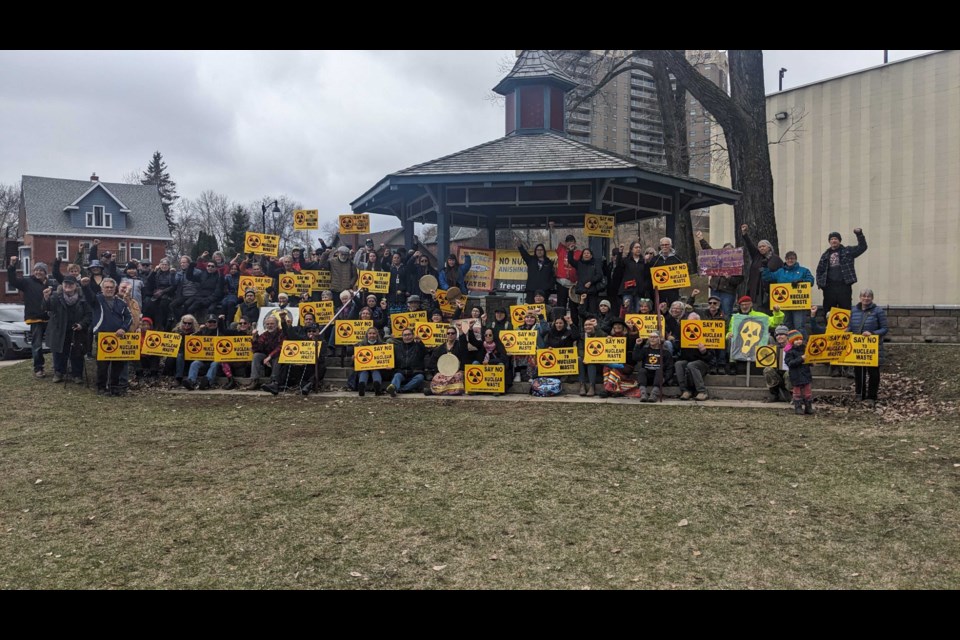THUNDER BAY – With the decision on where Canada will store its nuclear waste looming, four of the six First Nations representatives from the Land Defence Alliance held a rally in Waverley Park to voice their concerns and dangers of this controversial project.
“We're concerned about future leaks and accidents and we're very concerned that if that should happen, it could contaminate the local environment like the animals and also the air and the grounds,” said Grassy Narrows Chief Rudy Turtle in an interview with Dougall Media.
Turtle was the first to take the microphone and send out a profound message of solidarity with his fellow First Nations who are opposed to the burial of used nuclear waste in the Revell Lake area.
Currently, Ignace Township and nearby Wabigoon Lake Ojibway Nation are each in a “willingness process” to decide whether they will be hosts for a deep geological repository between their communities.
Outside of Ignace and Wabigoon Lake Ojibway Nation, no other municipality or First Nation communities have a right to vote on their willingness to allow the storage of nuclear waste in Northwestern Ontario.
In southern Ontario, the municipalities of South Bruce and Saugeen Ojibway Nation are also considering being willing hosts to the repository where it is situated near them.
For many, there are too many variables and “what if” questions as the deep geological repository project slowly becomes less like a science fiction concept.
The trouble is that for many First Nation communities, the government's track record of leaving contaminated industrial sites on treaty land has given way to skepticism.
During the rally, Coun. Samuel McKay from Kitchenuhmaykoosib Inninuwug First Nation spoke about how a nearby mining camp was left abandoned. The mining company left equipment and barrels of chemicals to sink into the ground.
“We are concerned that there's no guarantee this is safe regardless of how safe it is proposed. And not only in the immediate but also in the future and now we understand there's long term concerns that could take place after those of us here today are all gone,” said McKay.
Chief Wilfred King from Gull Bay First Nation echoed McKay's environmental concerns. According to King, the Lac des Iles mine was responsible for a platinum palladium spill in the Lac des Iles Lake.
"We were always assured that don't worry about any spills. We were recently involved when there was a spill on one of the rivers on the Lac des Iles Road. We were monitoring the situation over 35 days and the Ministry of the Environment, Conservation and Park's position was that they didn't need to consult with Gull Bay First Nation, but we were very adamant that they had to.
“We were vehement that we weren't going to go away. And to this day, they couldn't remediate that spill and it was a platinum palladium spill and their response to the spill was that because they couldn't remediate, they would just bury it and we'll revisit it another day. So, if they can't deal with the platinum-palladium spill, how in the hell are they going to deal with the nuclear waste spill?”
On the other side of the issue, depending on which site is chosen, Canada’s nuclear waste will be transported to that site.
Turtle explained: “It's coming from down south which is like 28 hours of driving, or whether it's coming by train, it's still like over 20 hours and there's always the possibility of an accident. We've seen it happen with other chemicals. We've seen it happen with oil transportation.
“So, the potential, the possibility is there of an accident and people should be concerned about that. The towns that are in between during those 20-hour travel times. Those towns should be concerned. Those towns should be worried about the potential of having nuclear waste dumped or accidentally dumped along their communities.”
At the end of the rally, the Land Defence Alliance stood united to say no to the burial of nuclear waste in Northwestern Ontario.
